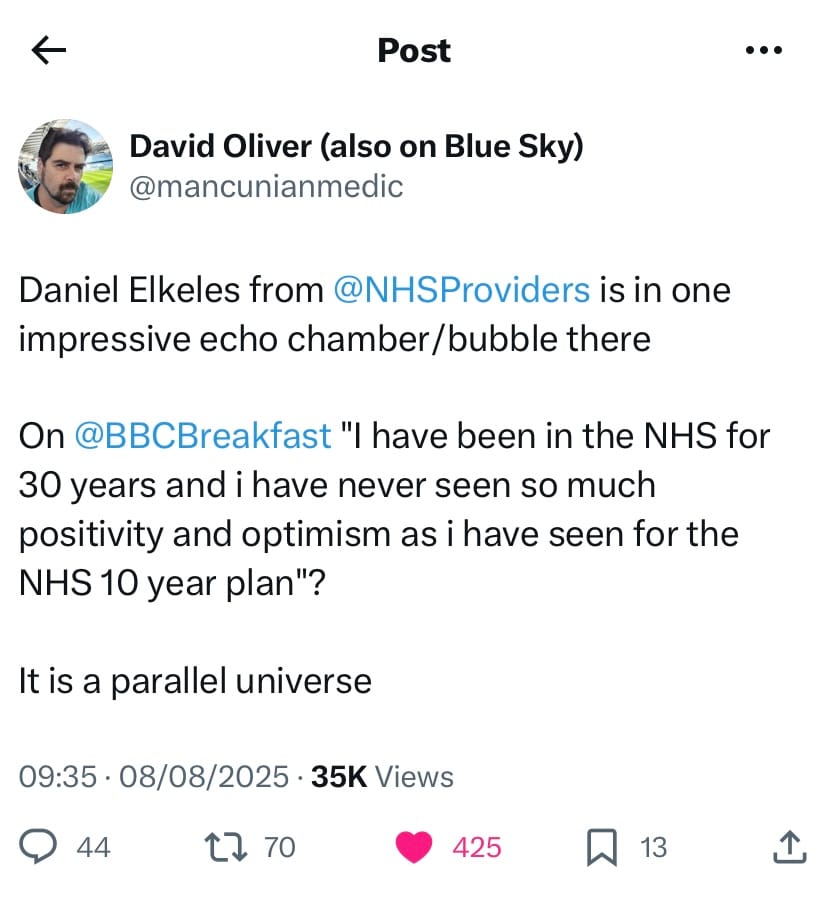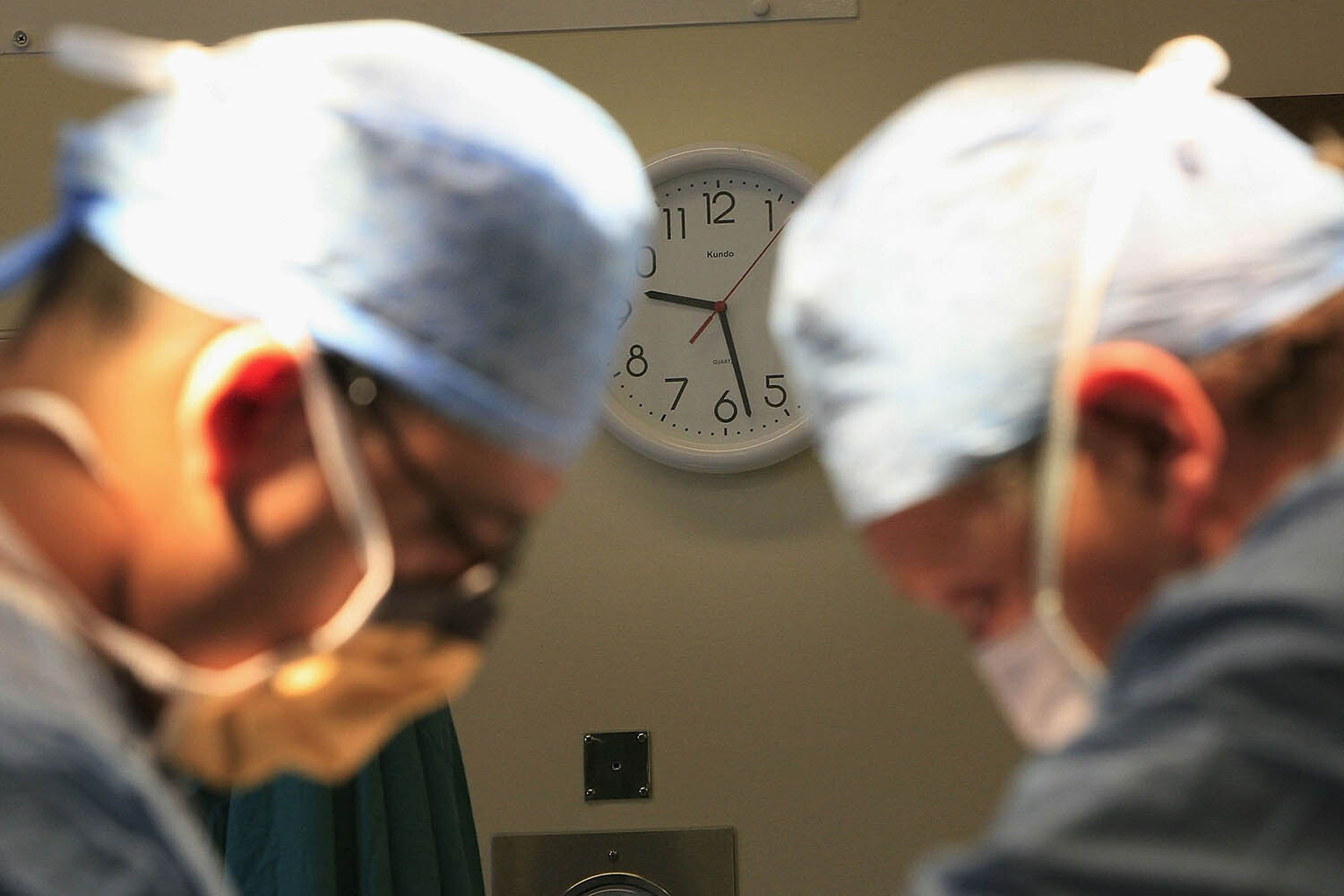Cowper’s Cut 388: Truce Social, Milburn opines and medical grumbles


This joint letter of thanks for strike activity continuation to staff from Health But Social Care Secretary Wes Streeting and NHS England head honcho Sir James Mackey just about managed to avoid pouring further kerosene onto the embers of the pay dispute with the BMA Resident Doctors 2008 Pay Differential Historical Re-Enactment Society.

So did the comments following Tuesday’s talks from the BMA resident doctors committee’s leaders, saying that “our conversation was informative and we feel that we have achieved a greater mutual understanding than in previous talks … We want to work with the DHSC to deliver on non-pay items it previously agreed to, and to forge mutual respect … we are clear, though, that going forward there has to be movement on pay”.
The absence of hostile media briefings from either party following Tuesday’s meeting between the two sides may also be a positive sign, following the broad failure of the five-day strike.
It would be premature to get our hopes up about a near-term end to this one: de-escalating a campaign is far harder than the opposite - particularly when it’s “a principle”.
But as SuperMac (and not Churchill) said, “jaw-jaw is better than war-war”. Maybe the two sides could keep their conversation going over digital media? They could call it ‘Truce Social’.
Milburn speaks
The Health Foundation has made a far better fist of podcasting than any other health organisation, and its chief executive Dr Jennifer Dixon recently interviewed former Health Secretary and current DHBSC senior advisor and Wes Streeting confidant-in-chief Alan Milburn for their podcast.
Milburn may not have had an original thought about the NHS in the more than two decades since he stood down (as his sadly-deleted 2014 ‘Seizing The Opportunity’ speech to NHS Providers in 2014 amply proved, and as I covered in some detail in this ‘Cut’ from November 2024), but his influence over the thinking of current SOS Wes Streeting is near-total.
So like it or not, we have to pay attention.
As you’d expect, this interview sees a fiesta of questionable assertions. Mr Milburn claims that “the operating model … is broken because you can't continue to run this gigantic system in the way that it's been run certainly over the last 15 or so years, which is a pretty centralised command and control system, with 20-odd thousand people sitting at the headquarters of the NHS … when it was performing at its best, it was performing in a much more devolved and much more diverse operating model”.
This is just factually wrong: the NHS in England’s peak of performance in living memory was in the late 2000s, under a period of intermediate-tier consolidation and largely as a result of the 6% real-terms year-on-year cash growth of that decade. Mr Milburn still shows no signs of having read ‘Understanding New Labour's market reforms of the English NHS’, and he really should.
His assertions get less reality-based, remarkably. Mr Milburn suggests that “if we're candid about the last 15 or so years, what has been missing? Many things have, but two things I would say is clarity and direction, and hope for the future”. Ironically, the coda of Mr Milburn’s 2014 NHS Providers lecture mentioned the then-impending arrival of Simon Stevens to run the NHS Commissioning Board as being a source of hope.
This reveals the big dilemma of Milburn’s argument: that the main problem of the current English NHS is that it had become too big and centralised.
He says, “we've got to stop viewing the health care system in this country as being about a single institution that we happen to call the National Health Service, and instead see it as being an ecosystem of very different providers, from telecos, techcos, of course private sector providers, at the margins, the public sector, and that's what it is.
“And the role of the centre by the way, back to that sort of thorny question, has got to be both to manage and convene that ecosystem rather than to direct or run a single institution.”
Yet at the same time as he argues this, Mr Milburn is directing the most almighty re-centralisation of power in the Department For Health But Social Care, via the abolition of NHS England and and Commissioning Support Units, and the huge cuts to Integrated Care Boards. (To point this out is not to claim that those organisations were delivering as they should: NHS England in particular had huge need to change and focus its scope.)
It’s very unclear how the current recentralisation of power will lead to the national leadership becoming magically good at managing and convening an ecosystem of players, as the Milburninan vision hopes.
Mr Milburn rightly says that “we've got to rebuild quite a lot of capabilities and capacity, and we know that the analytical capability, for example, on the commissioning side is nowhere near where it should be”. But such capacity as there remains sits in the CSUs that are being abolished.
More to the point, the notable thing about commissioning in the English NHS is that on every single occasion it has been tried, it has very largely failed. Longstanding readers may rcall that back in 2013, the late Professor Alan Maynard, one of the main advocates of the purchaser-provider split, wrote in his regular Health Policy Insight column that it had failed and should be abolished.

The arguable exception to this was in the optional, and thus non-universal, case of GP fundholding.
Yet Mr Milburn’s case (and that of the NHS Ten-Year Plan) is that commissioning will happen successfully this time, by a yet-to-be-described method.
Yes, I’m reassured too.

Speaking of The Blessed Plan, I suspect you may enjoy this post on Kiss (formerly Twitter) by Professor David Oliver: it recounts an heroic bit of Plan-related brown-nosing by NHS Providers chief executive Daniel Elkeles, who apparently told BBC Breakfast, “I have been in the NHS for 30 years, and I have never seen so much positivity and optimism as I have seen for the NHS Ten Year Plan”.
Denial: not just a river in Cairo.
Medical grumbles
It’s always interesting to track which health policy and political themes emerge in national media NHS coverage.
The past week has been long on medical grumbles. Nor are all of them are unjustified, by a long way.
Indeed, discontented resident doctors would have done far better in the court of public opinion by giving much greater weight to their many reasonable causes of discomfort about how they are trained and their careers progressed.
The creation of the current ‘rotation’ system was a very NHS reaction to problems with the previous way of training doctors under the previous consultant-led ‘firm’ structure. Where a consultant was a reasonable human being (as most were), the ‘firm’ structure could be an effective if paternalistic method of providing doctors in training with not only a tutor, but a patron.
The ‘firm’ training structure was in many cases superior at delivering a sense of camaraderie in the team (often in the adversity of dangerously long working hours), and at some form of pastoral care for the students.
Problems arose for training doctors when their consultant was antisocial, alcoholic, bitter, bullying or otherwise sociopathically toxic - as a significant minority inevitably were, often modelling onward the kind of training through which they’d suffered.
And it was quite widely known who those problematic consultants were.
So the two available options were: 1. act on the appalling behaviour by those consultants: firing a few of the very worst offenders and publicly stating why, while improving the improbable ones and gradually weeding out the unimprovables; or 2. introduce a rotation system, based on the notion that training doctors would be moved on so fast that the damage toxic consultants caused was limited.
Depressingly but perhaps inevitably, the NHS went for option 2.
The need for changes to training was also expedited by the controversial 2005 ‘Modernising Medical Careers’ reforms and the European Working Time Directive: this is a matter of mathematics, not medical politics. Somehow, it was not noticed that fewer working hours of doctors would mean that covering rotas would require a significant increase in training places.
Few people seem to think that the way the English NHS currently train resident doctors is a major triumph.
We should pay attention when a serious commentator such as the Financial Times ‘Inside Politics’ columnist Stephen Bush writes that “close to a third of the British medical students I knew in my late teens and early twenties now practice abroad: among medical students as a whole the average figure is now around one in seven … as clinical salaries in the UK remain low while conditions are poor compared to their peers, and as salaries in the country as a whole continue their long failure to recover from the financial crisis, a life practising medicine overseas becomes more and more attractive.”
The FT also picked up this theme in its reporting of the latest survey by the General Medical Council, whose latest ‘Workplace Experiences’ annual report found that nineteen per cent of doctors are exploring quitting their jobs, with a further 12 per cent are considering moving overseas to advance their careers or for higher pay.
Forty-three per cent of doctors reported having actively researched jobs overseas, with 15 per cent having already applied for international roles or spoken to recruiters.

I was also struck by this downbeat piece by retired neurosurgeon Henry Marsh for The Observer. He is promoting a new TV programme, ‘Confessions Of A Brain Surgeon’, due to broadcast on BBC2 on 18 August.
Professor Marsh is an eminent neurosurgeon: he is still involved in training at his former NHS employer. He has also led important charity medical work in Ukraine for decades.
He is, however, not an expert in NHS policy or management. Some of his comments in this Observer article, such as “successive UK governments – especially since 2009 – have tried to contain rising costs and silence complaints and warnings from the medical profession by introducing a new class of managers into the NHS”, are simply wrong. No new classes of managers were created in 2009. In reality, the 2010-12 Lansley reforms cut NHS management to 45% of its 2008-9 level.
If Professor Marsh wants to date the introduction of professional management as the start of the NHS’s exile from the Garden Of Medically-Led Eden, it’d help if he got his facts and decades right: the 1983 Griffith Report saw the genesis of modern NHS management.
Indeed a notable feature of NHS provider organisation leadership over recent years has been an increase in the number of clinicians becoming chief executives. 2017 data from NHS Providers found that about a third of chief executives at that time had a clinical qualification. This academic study shows “the positive effect of having a critical mass of medical leaders on the SMT of public hospitals on patient experience scores and infection rates”.
What really stuck out was his comments that “my surgical colleagues are lucky if they get to operate more than one day a week, and when they do operate, they get much less work done than I did. It is extraordinary just how inefficient the department I used to work in has become over the last 20 years.”
It’s a remarkable statement. So I went to look at his old patch of the Atkinson Morley Neurosurgery Unit of St George’s: their website states that “newly published mortality data shows that the St George’s Hospital neurosurgery unit has a lower than expected mortality rate”. They also link to published data on their unit and consultants (although at the time of writing, the link is not opening).
Professor Marsh’s long interview with the Boris Johnson Fanzine also promoting the programme offers a rather more rounded picture of this significant clinician. He is clearly entitled to his opinions about how the English NHS has been and is run, but his odd diagnosis about the impact of management is a useful reminder that not every medical grumble is well-founded.
Recommended and required reading
Stop whatever you’re doing now that you’ve read (or at least scanned) the column, and treat yourself to the brilliant Nigel Edwards’ co-piloting with Co-Pilot of Nigel’s review of the 10-Year Plan in the styles of ‘Ulysses’ by James Joyce. Maybe there is a point to AI, after all …
Times health editor Eleanor Hayward looks at why Northumbria Healthcare FT, Sir James Mackey’s old fiefdom, is so high-performing.
“Initially, NHS England had indicated there would be a central pot, but it has since become clear this does not exist”. Shaun reports for the Sunday Times that yes, employment law over redundancy applies to NHS managers.
Excellent article on capital, estates and maintenance by HSJ’s Henry Anderson.
The FT reports on how the NHS aims to slash clinical trials set-up time from 9 months to 10 weeks, to attract pharma research here.
Another quality ‘Mythbuster’ from Steve Black in HSJ, looking at why London’s major trauma reconfiguration in the early 2010s worked.
Oh Jesus, the Tony Blair Institute have written about saving the NHS with technology again. It’s painfully bad.



